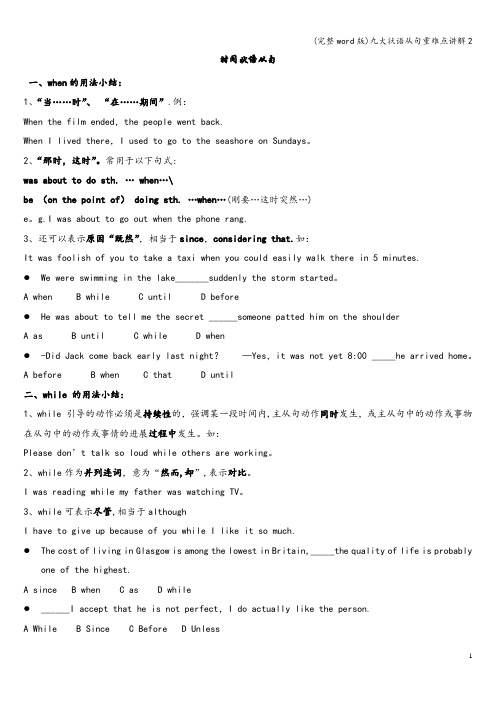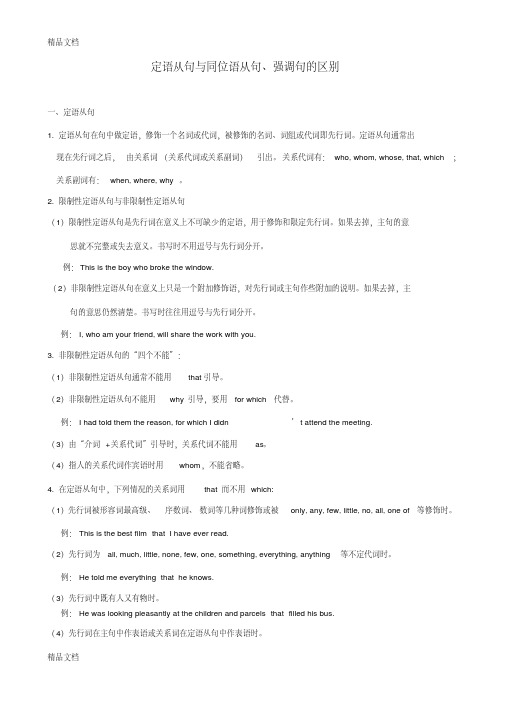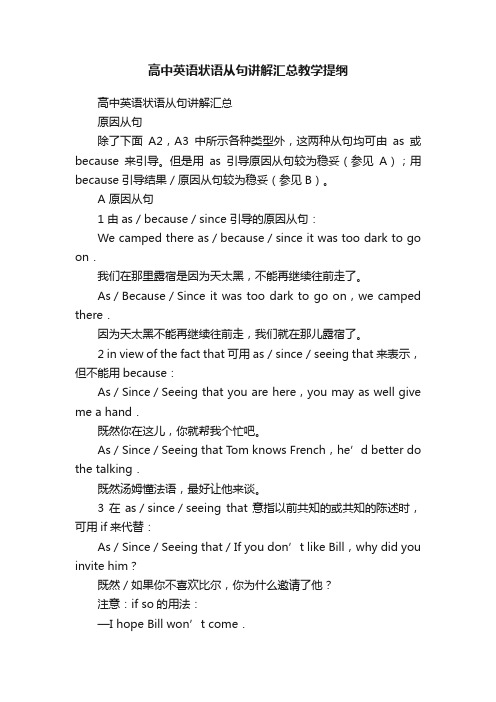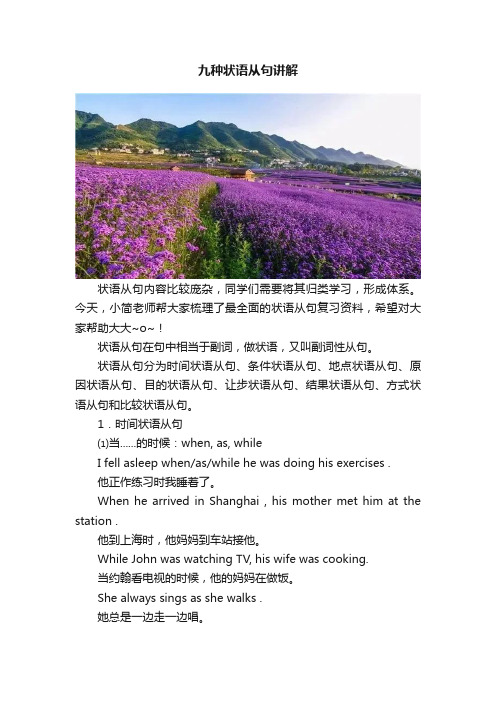状语从句(9种教学提纲
(完整word版)九大状语从句重难点讲解2

时间状语从句一、when的用法小结:1、“当……时”、“在……期间”.例:When the film ended,the people went back.When I lived there,I used to go to the seashore on Sundays。
2、“那时,这时”。
常用于以下句式:was about to do sth. … when…\be (on the point of) doing sth. …when…(刚要…这时突然…)e。
g.I was about to go out when the phone rang.3、还可以表示原因“既然”,相当于since,considering that.如:It was foolish of you to take a taxi when you could easily walk there in 5 minutes.●We were swimming in the lake_______suddenly the storm started。
A whenB whileC untilD before●He was about to tell me the secret ______someone patted him on the shoulderA asB untilC whileD when●-Did Jack come back early last night?—Yes,it was not yet 8:00 _____he arrived home。
A beforeB whenC thatD until二、while 的用法小结:1、while 引导的动作必须是持续性的,强调某一段时间内,主从句动作同时发生,或主从句中的动作或事物在从句中的动作或事情的进展过程中发生。
如:Please don’t talk so loud while others are working。
九种状语从句的引导词及例句-概述说明以及解释

九种状语从句的引导词及例句-概述说明以及解释1.引言文章1.1 概述部分的内容可以如下所示:引言是文章的开头部分,用来引出文章的主题和目的。
在本文中,我们将探讨九种状语从句的引导词及其例句。
状语从句是句子中的一个从句,用来修饰或补充主句的意思,起到说明、解释、强调等作用。
通过学习和掌握这九种状语从句的引导词和例句,我们可以更准确地表达自己的意思,使句子更加丰富多样,增加语言表达的灵活性。
同时,了解状语从句的不同引导词所表达的意义和用法,有助于我们更好地理解他人的意思,增进沟通和交流的效果。
本文将分别介绍九种状语从句的引导词及其例句,并对其用法进行详细解释和举例说明。
通过逐个进行分析,我们可以更深入地理解每种引导词的特点和用法,并掌握在实际应用中的技巧。
在正文部分,我们将分别对引导词1到引导词9进行介绍,包括引导词的意义、用法以及具体的例句。
在结论部分,我们将对所学内容进行总结,并展望未来在语言表达中更加灵活运用九种状语从句的引导词的可能性。
通过阅读本文,我们将获得对九种状语从句的引导词及其例句的全面理解,并且能够在实际应用中灵活运用,提升自己的语言表达能力。
让我们一起开始探索九种状语从句的引导词吧!1.2 文章结构本文将分为三个部分进行阐述。
首先,我们将给出九种状语从句的引导词的概述。
其次,我们将逐个详细介绍这九种引导词,并给出例句来说明其用法。
最后,我们将对这九种引导词进行总结,并展望它们在实际写作中的应用。
通过这样的文章结构,我们将全面深入地了解九种状语从句的引导词及其用法。
章1.2文章结构部分的内容1.3 目的本文的目的是介绍九种状语从句的引导词及其使用方法,并通过例句来展示这些引导词在句子中的运用。
通过学习这些引导词,读者可以更好地理解和运用状语从句,提高写作和阅读的能力。
具体而言,本文的目标如下:1. 提供九种常见的状语从句引导词,包括时间、地点、条件、原因、结果、目的、方式、让步和比较等方面的引导词,帮助读者掌握常见的引导词的用法和特点。
定语从句与同位语从句、强调句、状语从句的区别教学提纲

定语从句与同位语从句、强调句的区别一、定语从句1. 定语从句在句中做定语,修饰一个名词或代词,被修饰的名词、词组或代词即先行词。
定语从句通常出现在先行词之后,由关系词(关系代词或关系副词)引出。
关系代词有:who, whom, whose, that, which;关系副词有:when, where, why。
2. 限制性定语从句与非限制性定语从句(1)限制性定语从句是先行词在意义上不可缺少的定语,用于修饰和限定先行词。
如果去掉,主句的意思就不完整或失去意义。
书写时不用逗号与先行词分开。
例:This is the boy who broke the window.(2)非限制性定语从句在意义上只是一个附加修饰语,对先行词或主句作些附加的说明。
如果去掉,主句的意思仍然清楚。
书写时往往用逗号与先行词分开。
例:I, who am your friend, will share the work with you.3. 非限制性定语从句的“四个不能”:(1)非限制性定语从句通常不能用that引导。
(2)非限制性定语从句不能用why引导,要用for which 代替。
例:I had told them the reason, for which I didn’t attend the meeting.(3)由“介词+关系代词”引导时,关系代词不能用as。
(4)指人的关系代词作宾语时用whom,不能省略。
4. 在定语从句中,下列情况的关系词用that而不用which:(1)先行词被形容词最高级、序数词、数词等几种词修饰或被only, any, few, little, no, all, one of等修饰时。
例:This is the best film that I have ever read.(2)先行词为all, much, little, none, few, one, something, everything, anything等不定代词时。
初中状语从句详解教学提纲

① such + a/an + adj. + n. (单数名词)+ that
It’s such an funny movie that we can’t miss it.这是部如此有趣的电影,我们不能错过了。
② such + adj. + n.(复数名词)+ that These are such small shoes that I can’t wear them.这些鞋都太小,我穿不了。
第十三页,共23页。
2. unless = if not
Let's go out for a walk unless you are too tired. If you are not too tired, let's go out for a walk. 如果你不是太累的话,我们就出去(chū qù)散步吧。
他清了清嗓子,像要说什么似的。 The waves dashed on the rocks as if in anger. 波涛冲击着岩石,好像(hǎo xiànɡ)很愤怒。
第七页,共23页。
三、原因状语(zhuàngyǔ)从句
because, since, as和for引导原因从句(cónɡ jù)的 比1、较be:cause语势最强,用来(yònɡ lái)说明别人所不知的原因
虽然他尽了努力,但他的工3、ever if, even though 即使(jíshǐ)
We'll make a trip even though the weather is bad. 即使天气不好,我们(wǒ men)还是会去旅行。
状语从句(基础版)教学文案

while:持续性动词 /进行时
e.g. I like listening to music while I am doing my homework.
例句:我会待在这里,直到你回来为止。
I’ll stay here until you come back.
◆当主句谓语动词是非延续性动词时, 主句常用否定形式。 not… until…“直到……才……” 例句:他直到做完作业才睡觉。
He didn’t go to bed until he finished his homework.
We’ll come over to see you on Saturday if we have time. We should serve the people as / so long as we live.
1. We will be able to get there on time, ____ our car
whenever
• 表:每当… • Whenever we are in trouble, he will come to help
us.
• Whenever you say “I’m sorry”, look the person right in the eyes.
• Smile whenever you pick up the phone.
doesn’t break down on the road.
A. as soon as
B. as far asB.C as long asD. as well as
高中英语状语从句讲解汇总教学提纲

高中英语状语从句讲解汇总教学提纲高中英语状语从句讲解汇总原因从句除了下面A2,A3中所示各种类型外,这两种从句均可由as或because来引导。
但是用as引导原因从句较为稳妥(参见A);用because引导结果/原因从句较为稳妥(参见B)。
A 原因从句1 由as/because/since 引导的原因从句:We camped there as/because/since it was too dark to go on.我们在那里露宿是因为天太黑,不能再继续往前走了。
As/Because/Since it was too dark to go on,we camped there.因为天太黑不能再继续往前走,我们就在那儿露宿了。
2 in view of the fact that可用as/since/seeing that来表示,但不能用because:As/Since/Seeing that you are here,you may as well give me a hand.既然你在这儿,你就帮我个忙吧。
As/Since/Seeing that Tom knows French,he’d better do the talking.既然汤姆懂法语,最好让他来谈。
3 在as/since/seeing that意指以前共知的或共知的陈述时,可用if来代替:As/Since/Seeing that/If you don’t like Bill,why did you invite him?既然/如果你不喜欢比尔,你为什么邀请了他?注意:if so的用法:—I hope Bill won’t come.—If so(=If you hope he won’t come),why did you invite him?—我希望比尔别来。
—如果这样(=如果你希望他不来),你为什么邀请了他?关于if+so/not,参见第347节。
九大状语从句精讲课件高考英语一轮复习

• As you grow older, you'll know better and better about yourself.
区别点
翻译
词
引导动词
as when while
当……时候; 一边……一边;
随着
当……时候
瞬时性或延续想 动作
since
after that
2.地点状语从句
Where wherever Anywhere Everywhere
where
具体地点: ➢ The little girl who got lost decided to remain where she was
and wait for her mother. 虚拟地点: ➢ Where there is a will, there is a way. 有志者, 事竟成。
1.__A_s_______ the average age of the population increases, there are more and more old people to care for.
2.If you miss this chance, it will be years ___b_e_f_o_r_e__ you get another one.
2.在“It is +一段时间+since +时 间点”始。 It is three years since the war
broke out. It is ten minutes since he slept.
他已经睡了十分钟了。
练习 1.He had left the town __b_e_fo_r_e she arrived. 2.As is reported, it is 100 years since Tsinghua University was founded.
九种状语从句讲解

九种状语从句讲解状语从句内容比较庞杂,同学们需要将其归类学习,形成体系。
今天,小简老师帮大家梳理了最全面的状语从句复习资料,希望对大家帮助大大~o~!状语从句在句中相当于副词,做状语,又叫副词性从句。
状语从句分为时间状语从句、条件状语从句、地点状语从句、原因状语从句、目的状语从句、让步状语从句、结果状语从句、方式状语从句和比较状语从句。
1.时间状语从句⑴当......的时候:when, as, whileI fell asleep when/as/while he was doing his exercises .他正作练习时我睡着了。
When he arrived in Shanghai , his mother met him at the station .他到上海时,他妈妈到车站接他。
While John was watching TV, his wife was cooking.当约翰看电视的时候,他的妈妈在做饭。
She always sings as she walks .她总是一边走一边唱。
注意:when 引导的时间状语从句中的谓语动词可以是持续的也可以是瞬时的;while和as引导的时间状语从句中的谓语动词必须是持续的。
⑵一......就......as soon as, the minute, the moment,the instant,immediately , directly, instantly, no sooner … than..., hardly …when..., scarcely…when...The children ran away from the orchard(果园) the moment they saw the guard.孩子们一看到守卫就从果园跑掉了。
No sooner had I arrived home than it began to rain.我一到家天就开始下雨。
- 1、下载文档前请自行甄别文档内容的完整性,平台不提供额外的编辑、内容补充、找答案等附加服务。
- 2、"仅部分预览"的文档,不可在线预览部分如存在完整性等问题,可反馈申请退款(可完整预览的文档不适用该条件!)。
- 3、如文档侵犯您的权益,请联系客服反馈,我们会尽快为您处理(人工客服工作时间:9:00-18:30)。
1.时间状语从句常用引导词:when, as, while, as soon as, before, after, since , till, until特殊引导词:the minute, the moment, the second, every time, the day,the instant, immediately , directly, no sooner … than, hardly …when, scarcely … whenI didn’t realize how special my mother was until I became an adult.While John was watching TV, his wife was cooking.The children ran away from the orchard(果园), the moment they saw the guard.No sooner had I arrived home ,then it began to rain.Every time I listen to your advice, I get into trouble.2.地点状语从句常用引导词:where特殊引导词:wherever, anywhere, everywhereGenerally, air will be heavily polluted where there are factories.Wherever you go, you should work hard.地点状语从句§4地点状语从句 (adverbial clause of place) 地点状语从句一般由连接副词where, wherever等引导,已经形成了固定的句型,例如:句型1:Where+地点从句,(there)+主句。
【注意】此句型通常译成“哪里……哪里就……”;主句在从句后面时,there可用可不用;如果主句在从句的前面时,一般都不用there。
例如:Where there is no rain, farming is difficult or impossible.在没有雨水的地方,耕作是困难的,或根本不可能的。
They were good persons. Where they went, there they were warmly welcomed. 他们都是好人。
因此他们走到哪里都受到热烈欢迎。
You should have put the book where you found it. 你本来应该把书放回原来的地方。
Where the Communist Party of China goes, there the people are liberated.哪里有了中国共产党,哪里人民得解放。
句型2:Anywhere/ wherever+地点从句,+主句。
【注意】anywhere本身是个副词,但是,常可以引导从句,相当于连词,意思相似于wherever, anywhere 引导的从句可位于主句之前,也可以位于主句之后。
而wherever本身就是个连词,表示“在何处,无论何处”。
例如:Wherever the sea is , you will find seamen.有海就有海员。
3回答者:快乐如3.原因状语从句常用引导词:because, since, as, for特殊引导词:seeing that, now that, in that, considering that, given that.My friends dislike me because I’m handsome and successful.Now that everybody has come, let’s begin our conference.The higher income tax is harmful in that it may discourage people from trying to earn more. 4.目的状语从句常用引导词:so that, in order that特殊引导词:lest, in case, for fear that,in the hope that, for the purpose that, to the end that The boss asked the secretary to hurry up with the letters so that he could sign them.The teacher raised his voice on purpose that the students in the back could hear more clearly. 5.结果状语从句常用引导词:so … that, such … that,特殊引导词:such that, to the degree that, to the extent that, to such a degree that,He got up so early that he caught the first bus.It’s such a good chance that we must not miss it.To such a degree was he excited that he couldn’t sleep last night.6.条件状语从句常用引导词:if, unless,特殊引导词:as/so long as, only if,providing/provided that, supposing that, in case that, on condition thatWe’ll start our project if the president agrees.You will certainly succeed so long as you keep on trying.Provided that there is no opposition, we shall hold the meeting here.7.让步状语从句常用引导词:though, although, even if, even though特殊引导词: as(用在让步状语从句中必须要倒装),while ( 一般用在句首 ),no matter …, in spite of the fact that, while, whatever, whoever, wherever, whenever, however, whicheverMuch as I respect him, I can’t agree to his proposal.尽管我很尊敬他,我却不同意他的建议。
The old man always enjoys swimming even though the weather is rough.No matter how hard he tried, she could not change her mind.He won’t listen whatever you may say.8.比较状语从句常用引导词:as(同级比较), than(不同程度的比较) 特殊引导词:the more … the more … ; just as …,so…; A is to B what /as X is to Y; no … more than; not A so much as BShe is as bad-tempered as her mother.The house is three times as big as ours.The more you exercise, the healthier you will be.Food is to men what oil is to machine. 食物之于人,犹如油之于机器。
9.方式状语从句常用引导词:as, as if, how特殊引导词:the wayWhen in Rome, do as the Roman do.She behaved as if she were the boss.Sometimes we teach our children the way our parents have taught us.要点:表示状语从句由连词if, unless (=if not) 引导。
1.If it doesn’t rain tomorrow, we will go hiking.如果明天不下雨, 我们就去远足.2.You will get good grades if you study hard.如果你努力学习,就会取得好成绩.3.I will go to the party unless he goes there too.我会去参加聚会的, 除非他也去.(如果他不去,我就去.)4.You will be late unless you leave immediately.如果你不马上走,你将会迟到的.(=If you don’t leave immediately, you will be late.)难点提示:用条件状语从句时要注意时态的正确使用,当主句是将来时的时候,从句要用一般现在时.lHe will not leave if it isn’t fine tomorrow.一般将来时,一般现在时lThey are going to have a picnic if it doesn’t rain next week.一般将来时, 一般现在时.难点——because , since , as , for,辨析1)because语势最强,用来说明人所不知的原因,回答why提出的问题。
当原因是显而易见的或已为人们所知,就用as或 since。
I didn’t go, because I was afraid.Since /As the weather is so bad, we have to delay our journey.2)由because引导的从句如果放在句末,且前面有逗号,则可以用for来代替。
但如果不是说明直接原因,而是多种情况加以推断,就只能用for。
He is absent today, becaus e / for he is ill.He must be ill, for he is absent today.3) as和for的区别:通常情况下,as引导的从句在主句前,for引导的从句在主句后。
